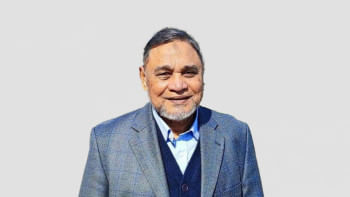Rohingya repatriation to dawn a new beginning
Foreign Minister AH Mahmood Ali yesterday said the issue of Rohingya influx with Myanmar remained as an irritant in bilateral relations between the two countries and hoped there would be a new beginning with Myanmar through Rohingya repatriation.
"With the repatriation of the Rohingyas under the arrangement signed on November 23, 2017, we hope to have a new beginning with Myanmar. We hope to see the problem to be resolved permanently with sustainable return of the Rohingyas to Myanmar," he said.
The foreign minister said the government's policy of friendly relations with neighbours guided them through this difficult time with Myanmar.
"You're all aware that the Rohingya influx from Myanmar to Bangladesh has soured our relations in recent times. However, we remained steadfast in our foreign policy objective and continued our bilateral engagements with Myanmar," he said.
In 2017, Ali said, the world witnessed one of the fastest growing human movements of history as Myanmar orchestrated an unprecedented exodus of Rohingyas from its Rakhine State.
More than 655,500 desperate Rohingyas entered Bangladesh crossing a border of 40 miles.
He said the helpless Rohingyas faced worst forms of human rights violations owing to their religion and race.
"Bangladesh, as an immediate neighbour, had to bear the brunt of hosting now over one million forcibly displaced population in its territory," the minister said.
The foreign minister was addressing a seminar titled "Changing Global Dynamics: Bangladesh Foreign Policy", highlighting "Evolving Bangladesh Foreign Policy in the Context of Contemporary Geopolitics" at Bangladesh Institute of International and Strategic Studies (BIISS).
As a natural connect between South and South-East Asia and beyond, he said Bangladesh will continue to pursue regional cooperation as an engine for sustainable growth and economic integration through Saarc, Bimstec, BBIN, SASEC, and BCIM.
To secure economic benefits, the foreign minister said, Bangladesh will continue to forge effective partnerships with other countries.
"We've already developed such partnerships with India, China, Japan, the UK and the USA in recent years across mega infrastructure, power and energy sector projects, etc," he said.
The minister said Bangladesh will continue to stretch its partnership in multiple fronts.
He said human rights and fundamental freedoms are the keys to the country's existence. "After ending the culture of impunity through the trial of war criminals who committed genocide and crimes against humanity during our War of Liberation in 1971, we're now focusing on international recognition of the 1971 genocide."
He said Bangladesh will continue to maintain a lead role in UN peacekeeping operations by contributing troops, police, including female peacekeepers. "We would also gradually bring more focus on peacebuilding activities," he added. "As we've done recently with the issue of Rohingyas, we'll continue to utilise our image in the multilateral forum to further our national interest."
"Beyond our deeper engagement with Western Europe, our outreach to Eastern Europe, Africa, Latin America has been extended to explore new markets for our products and labour and thus to best ensure Bangladesh's economic security," he mentioned. In the coming days, the minister said, they will continue to work together to fulfill foreign policy vision and strategy under the normative guidelines of Vision 2021 and Vision 2041.
State Minister for Foreign Affairs M Shahriar Alam, foreign Secretary M Shahidul Haque and BIISS Chairman Ambassador Munshi Faiz also spoke at the programme.
Ahsan H Mansur, executive director of the Policy Research Institute (PRI); Maj Gen AKM Abdur Rahman, director general of BIISS; Tasneem Siddiqui, a professor of political science at Dhaka University; made separate presentations at the seminar.

 For all latest news, follow The Daily Star's Google News channel.
For all latest news, follow The Daily Star's Google News channel. 



Comments